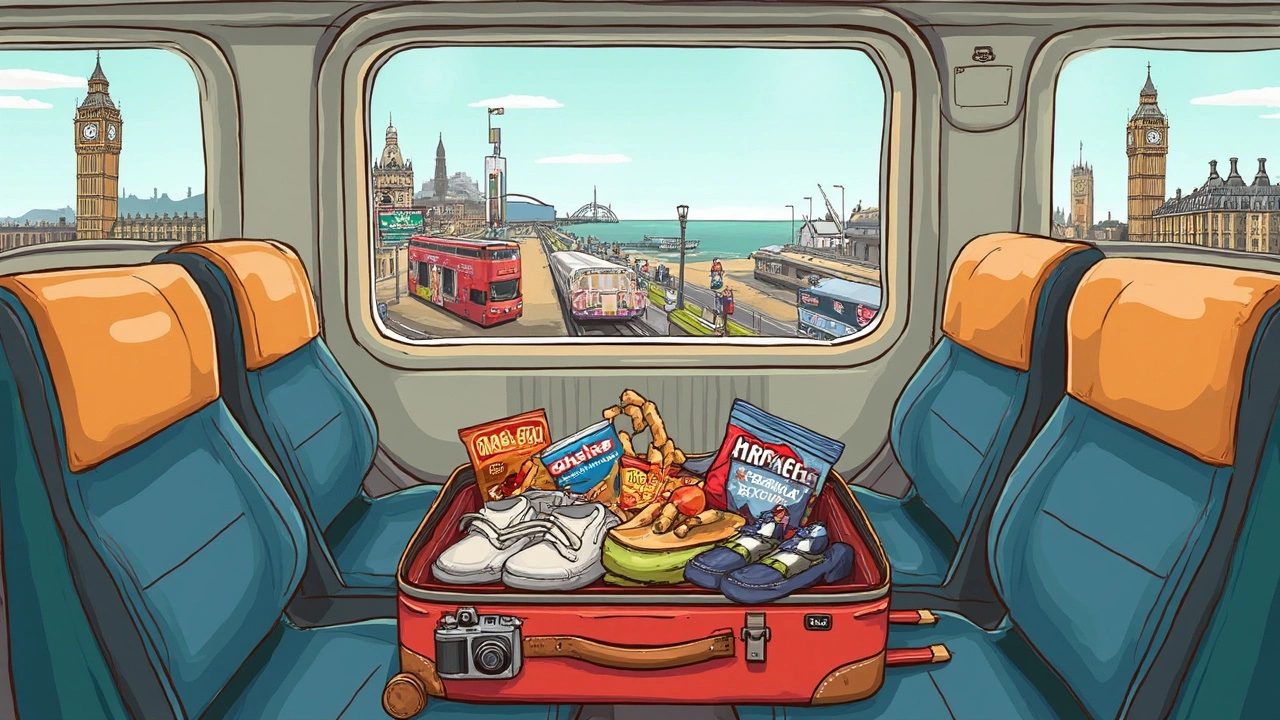Picture this: You’re itching to escape. Your phone keeps flashing those travel reels and you’re two days from losing it if you see another coworker’s vacation photo. The catch? Your bank account isn’t feeling as adventurous as your mind — you’ve got $500 earmarked for the whole adventure. Does that even get you out of your zip code these days? The answer: it can, if you play your cards right.
Breaking Down the $500 Weekend: Where Your Money Goes
That $500 has a lot of work to do. It needs to cover transportation, a place to sleep, food, maybe a couple of drinks, and whatever fun or memories you want to squeeze in. If you don’t keep your wits about you, the money vanishes before the trip even starts. Let’s put it under the microscope and see what you’re really signing up for.
Start with how you get there. Gas prices in the US averaged about $3.89 per gallon in July 2025, and rental cars are higher than they used to be. Domestic flights? According to Hopper’s Summer 2025 Travel Outlook, the average US flight is hovering around $287 round-trip right now. That alone could chew up half your budget. On the other hand, a bus or train ticket for short regional hops can run as low as $30-60 round-trip.
What about sleeping? Hotels in mid-sized cities average $130/night for basics, and big cities laugh at numbers under $200. Motels, if you’re cool with the vibe, or local vacation rentals sometimes offer rooms under $90 a night. Of course, if you’re really scrappy — think hostels or even a campground — you might get away with $35-60 each night. Sharing with a friend slices this even thinner.
Food might sound secondary, but it adds up quicker than you think. Budget $8-15 for breakfast at a diner, $12-25 for lunch, and $20-40 for dinner unless you swap one meal with a cheap supermarket run. Bringing your own snacks and a water bottle can save you from the bloodbath of pricey tourist stops and keep you from getting hangry (grumpy + hungry meets ruined trip).
We can’t forget actual fun. A lot of what makes a travel weekend memorable — museums, music shows, outdoor adventures — has entrance fees that go from pocket change to $50 (or more if you ignore those $13 stadium beers). Sometimes, you’ll find free events, hiking, beach days or open-air festivals. These are the jackpot for keeping your wallet happy.
Let’s lay it out in a quick table so you get a sense of how the pieces fit:
| Expense | Low Range ($) | High Range ($) |
|---|---|---|
| Transportation (round-trip) | 40 | 300 |
| Accommodation (2 nights) | 70 | 300 |
| Food & Drinks | 60 | 150 |
| Activities/Fun | 20 | 80 |
| Total | 190 | 830 |
See where I’m going? Every dollar gets you something different depending on your transportation and accommodation choices. If you can drive or carpool, pick somewhere within 2-3 hours of home, and stick to budget lodging, you’re golden. If you add a flight, you’ll need to get extra creative elsewhere.

Real-World Strategies for Stretching 0
Alright, you don’t care about theory — you just want to actually go somewhere. How do you make $500 cover a weekend you’ll actually brag about after?
First rule: go local, go off-peak, and go with friends. Traveling within your own state or region cuts transportation costs hard. For example, taking a train from New York to Philadelphia or Boston runs about $50-80 round-trip. Driving from Dallas to Austin? That’s about a full tank of gas, roughly $45 with a decent car. If you travel in September or early spring, hotel prices often dip below the summer craze. The same goes for less “famous” spots — Buffalo beats Miami for savings, and the little beach towns or lake spots are often way less crowded (plus less expensive) than the hotspots.
Next, consider where you’re sleeping. Hostels aren’t just for gap year backpackers anymore; some are private, clean, and even have free breakfasts. Airbnb or VRBO has some real gems if you’re willing to search for single rooms or guesthouses. Here’s the hack though — travel with a buddy or two. Share a room and a tank of gas, which can cut both those costs in half or more. Don’t have people to crash with? Couchsurfing has made a comeback, and there are also local Facebook groups where friendly folks offer up space in exchange for a favor like dog-walking or babysitting.
Food is easy to blow cash on, but the trick is to make dining out the highlight, not the default. Grab coffee, fruit and a cheap pastry for breakfast — or hit up the grocery store on arrival for instant oatmeal, fruit, or yogurt. For lunch, you can pack sandwiches or hit food trucks that serve filling meals for under $12. Dinner, especially the last night, is where you splurge a bit. Look for local happy hours, or spots with big portions you can share. Some savvy travelers even plan their trip around farmer’s markets or local food festivals — eat well, soak up the vibe, and save the leftovers for tomorrow.
Now activities — if your destination is a city, they’ve usually got free walking tours, events in the parks, or outdoor fitness classes. Art galleries, comedy open-mics, and music at bars or breweries are way cheaper than ticketed concerts or clubs. Skip buying stuff you could get at home: souvenirs are fun, but $9 for a magnet or overpriced keychain? Pass. Instead, spend on something like kayak rentals, bike-sharing, or even a group painting or cooking class. That’s something you’ll actually remember.
There’s also tech on your side. Tons of apps help you track deals, find last-minute discounts, or uncover events that never make it to guidebooks. Hotel Tonight, Skyscanner, and Eventbrite can uncover price drops and half-off activity tickets. Public transit apps show route options you maybe never thought of. You can even get free museum admission just by showing your library card in some places. Not joking.
Now, if you want to see what $500 can net you in the real world, here are a couple of quick weekend examples:
- A nature escape from LA: Two people, drive out Friday to Joshua Tree. Lodging at a cool yurt for $110/night, bring your own food and drinks, hike, stargaze, cheap roadside dinner Saturday, split gas. You’ll finish Sunday with cash in your pocket.
- City adventure from Chicago: Megabus to Milwaukee for $35 round-trip, boutique hostel for $65/night, stuff your face at a legendary fish fry, hit up street art, breweries and a live show — still spend under $450 between buses, beds, meals plus a couple drinks each night.
- Beach bash from Atlanta: Drive to Tybee Island, rent a cheap cabin with friends, grill out, kayak rentals, sip margaritas, and catch the sunrise. Skip the restaurant crowd and you’ll probably bring home sand and $60 to spare.
Of course, if you want to fly last minute, stay right in the city center, eat every meal out and Uber everywhere, $500 won’t get you far. But planning smart — especially booking a month ahead or keeping the trip flexible — can spell the difference between an affordable escape and just another boring weekend scrolling TikTok at home.

Tips for Getting the Most from Your Weekend Getaway Budget
Maybe you love tight itineraries, or maybe your style is "show up and wing it." Either way, carving out more awesome from the same chunk of change takes a little strategy.
One thing people overlook? Timing. The most expensive weekends are those linked to big holidays, college football games, festivals, you name it. Shifting plans by even a week can trim your costs on everything from hotels to ride shares. If you work a flexible job, swap to a Thursday-Saturday or Saturday night to Monday trip and you could shave $50-100 off the price of a Friday arrival.
Loyalty programs and points are a game changer. Even if you're not a frequent flyer, apps like Booking.com or Hotels.com give instant discounts or perks like free breakfast with just one stay. Some credit cards earn points or cash back on gas and hotels with no annual fee. Use them smartly and treat that rebate as found travel money.
Single biggest budget killer? Last-minute splurges. It’s so easy to blow $100 on impulse: a couple craft cocktails, an unplanned shopping spree, an unexpected ride share surge. Decide ahead where you’ll spend a little extra (maybe that rooftop dinner), then stick to your plan for the rest. Giving yourself a daily limit — and pulling out cash for each day — makes it painfully obvious when you’re overindulging.
Weekend trip packing makes a surprising difference in your budget, too. If you pack light (carry-on only), you avoid checked bag fees and don’t get stuck buying overpriced jackets, sunscreen, or chargers you forgot at home. Throw in a refillable water bottle, earplugs, and a tiny first aid kit. It’s those little emergencies — headache pills, Band-Aids, a random phone charger — that can turn a cheap trip expensive in a flash if you have to buy them on the go.
People sometimes forget about public transit. Buses, subways, and trams are dirt cheap compared to taxis and can double as a city tour (just keep a map handy). If you're out late, check when the last bus or train leaves so you don’t end up forking over $37 for a ten-minute ride. Renting a bike or scooter isn’t just cool — sometimes it’s the easiest way to explore a new place without getting stuck in traffic or parking drama.
Want bonus points? Check whether your destination has reciprocal deals for students, seniors, veterans, or AAA members. Some major museums, gardens and parks offer free or super-discounted entry for memberships you may already have — or even just by booking online in advance. Even if you’re not affiliated, keep an eye on local tourist boards. Places desperate for visitors in the off-season sometimes have jaw-dropping package deals you’d never see in summer.
Here’s a simple checklist for making $500 go the distance:
- Plan in advance: Book travel and lodging at least 2-4 weeks out for the best prices.
- Go where the deals are: Let the destination be determined by flight, train, or lodging deals, not the other way around.
- Pack light & smart: Bring essential snacks, water, sun protection, and a few emergency supplies.
- Focus on experiences: Prioritize seeing, tasting, learning, and connecting over buying stuff.
- Stay flexible: Sometimes the weird detour you didn’t plan becomes the best memory of the trip.
So, is $500 enough for a weekend trip? Absolutely — if you make choices that match your budget and put value on the experiences, not the fancy trappings. The adventure comes from how you spend your time, not just your money. You don’t have to cross an ocean, or max out your credit card, for a weekend that leaves regular life in the dust. Sometimes it only takes a couple hundred bucks, a spark of curiosity, and a plan you’re ready to bend when the moment calls.

Menu